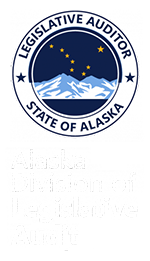| SUMMARY OF: | A Special Report on the Department of Health and Social Services, Division of Behavioral Health, SelectIssues, October 1, 2003. |
Purpose of the Report
In accordance with Title 24 of the Alaska Statutes and a special request by the Legislative Budget
and Audit Committee, we conducted a performance audit ofselect issuesrelated to Department of
Health and Social Services’ (DHSS), Division of Behavioral Health’s (DBH) administration of
substance abuse grants.
Our objectives included determining whether clients are receiving adequate and appropriate
services from substance abuse grantees and to identify areas for improving program management.
We were also asked to evaluate the grant award process and determine whether conflicts of interest
existed between the Division of Alcoholism and Drug Abuse (ADA) staff and recipients of grant
funds.
In FY 03, DHSS’ mental health section was merged with ADA to form the Division of Behavioral
Health. Throughout this report, we refer to ADA as the entity audited. However, recommendations
are made to DBH in recognition of the department’s current organizational structure.
Report Conclusions
ADA needs an operational plan to ensure the effective use of limited resources. ADA has not
identified the state’s substance abuse needs nor communicated the state’s priority for addressing
the needs. Consequently, the division is in a poor position to ensure its limited resources are used
effectively. General planning efforts by the Advisory Board on Alcoholism and Drug Abuse, the
Mental Health Trust Authority, and the Mental Health Board are hindered by ADA’s lack of an
operational plan. Such a plan would ensure the delivery ofsubstance abuse services was conducted
in accordance with general guidance from these entities.
DHSS needs to improve internal controls over reporting and investigating ethics complaints.
Conflicts of interest did exist at ADA and complaints alleging unethical behavior (undue influence
over the grant process) were not reviewed and investigated asrequired by statute. Two letters were
submitted to DHSS’ commissioner’s office alleging unethical behavior on the part of an ADA
employee. These letters were not forwarded to DHSS’ designated ethics officer for
review/investigation. The designated ethicssupervisor did become aware of complaints concerning
actions taken by a spouse of an ADA management level employee involving an ADA grantee.
However, no official investigation was conducted and the Department of Law was not informed of
the complaint as required by statute.
While we found that, in general, ADA appropriately awarded grants, several errors were made
during the FY 02 and FY 04 grant award process. Errors included missing documentation, lack of
required approvals, and inconsistent application of minimum requirement criteria. Additionally, we
found one ADA grantee was overpaid $273,000 in error.
Changes to the grant regulations improved the competitive grant proposal review process.
Under the new regulations, 80% of substance abuse grants were awarded under a noncompetitive process.
ADA effectively monitors its grantees. Grantees perceive ADA fiscal and program staff to be fair,
responsive, competent, objective, and easy to work with. Standards used to certify substance abuse
treatment facilities are outdated and may fail to adequately protect the public. The certification
standards were adopted in the mid 1970s and have not been updated to reflect best practices.
ADA’s MIS system is functionally inadequate and difficult to use. The system does not collect the
information necessary to evaluate the effectiveness of ADA’s programs and it does not provide
information useful to grantees in managing their programs. The division is working on a
collaborative project with other states to develop a new MIS system.
Findings and Recommendations
1. The Division of Behavioral Health’s (DBH) director should create a comprehensive program for
prevention and treatmentservicesto guide the delivery ofsubstance abuse services.
2. DBH’s director should take steps to improve its working relationship with the Advisory Board on
Alcoholism and Drug Abuse.
3. DBH’s directorshould take stepsto improve the grant award process.
4. The DHSS commissioner, in cooperation with the Department of Law, should pursue recoupment
of the FY 03 overpayment to an ADA grantee.
5. The DBH directorshould ensure the new MIS system is designed to addressthe deficiencies of its
currentsystemand collect the information necessary to evaluate the effectiveness of its programs.
6. The DHSS commissioner must implement internal controls over investigating and reporting of
potential ethics violationsto comply with statutes.
7. The DBH director should implement policies and procedures to guard against potential ethics
violations.
8. The DBH director should develop and implement written policies and procedures to ensure
compliance with state regulations governing subcontracts of grantees.
9. The DBH director should update the standards for treatment facilities to reflect current practices
and technology.
10.We recommend DHSS’ internal auditors provide training to DBH program managers and grant
administratorsto ensure that federal/state single audits of grantees are utilized to the greatest extent
possible.

